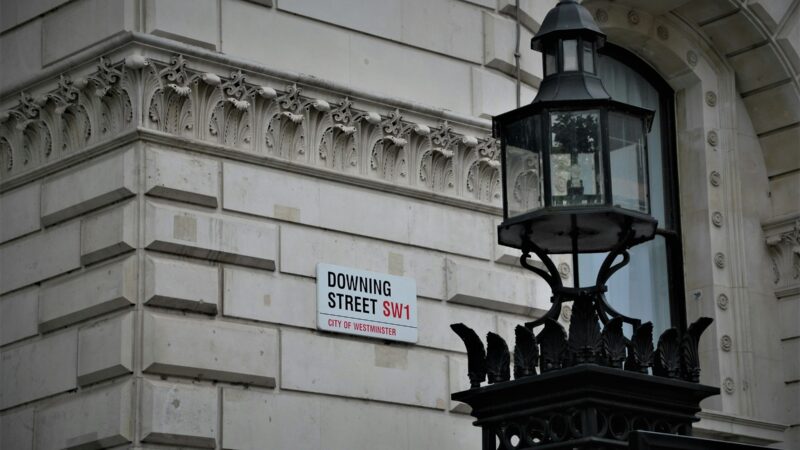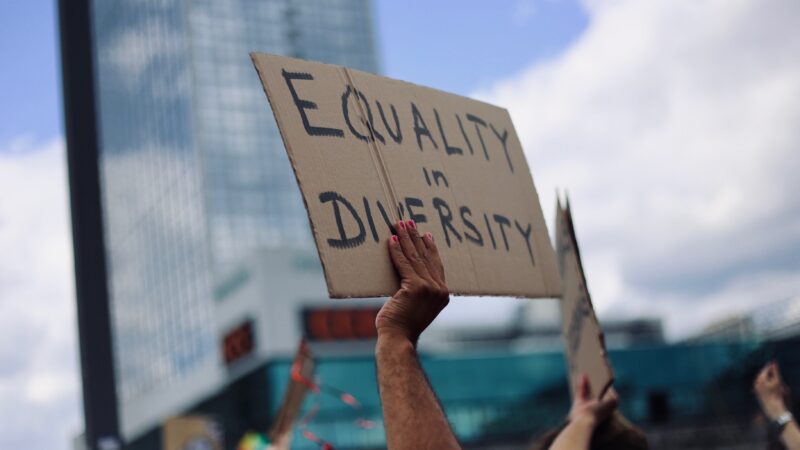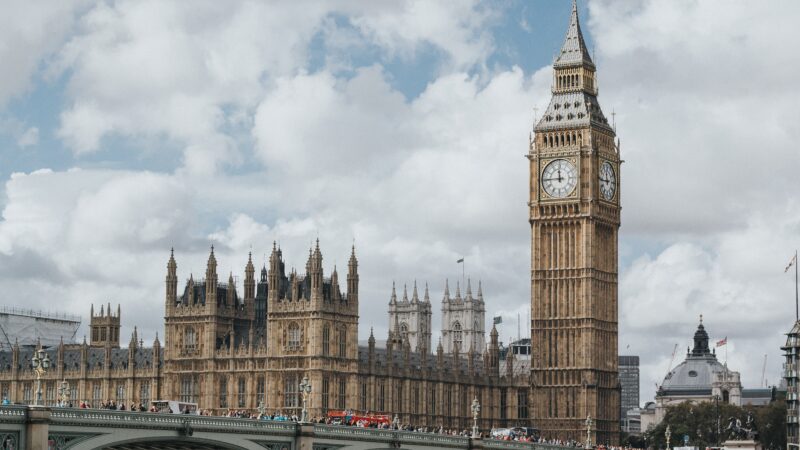As the Conservative Party leadership contest has unfolded, an issue wedge has gradually been inserted into its surrounding discourse. What is an issue wedge? It is a tactical device, not an organic manifestation, that is designed to divide ongoing political issues in a specific way. More specifically, it is meant to override organic political divisions with an arbitrary political division which favours the political agenda of the wedge-driver(s).
The problematic nature of the wedge is not its divisive nature. Quite the opposite, the problem of the wedge is that it denies all forms of political division; all political division except the form of division established through the wedge.
Division is the nature of the political; as Schmitt says: “the distinction between friend and enemy”. Where there is division, there is the opportunity for deliberation and conflict, and where there is deliberation and conflict, there is opportunity for change. When the opportunity for change is taken away, all that is left is the status quo. I refer to this as a wedge, rather than “depoliticization” for the sole reason that I am concerned with a specific instance of depoliticization, rather than depoliticization as a phenomenon. Whether it is understood as a strategy to create distance between governments and responsibility for implementing policy, an attempt to remove politics for the formulation of policy, or the more general practice of curtailing the agency of non-governmental actors, depoliticization is underpinned by the idea of removing things from the political arena, inoculating them against political critique, challenge, or change. Who decides what issues are removed from the political arena? That itself is a political matter, and more the focus of this article.
In this case, Tory Leadership discourse has been fractured by a Costalivin-Culture War wedge. In short: you must choose between solutions to Costalivin or fighting the Culture War. You are not allowed to support both.
Are you concerned by the police’s indifference to violent crime, or their willingness to harass normal individuals? Do you approve of vandalising and destroying taxpayer-funded statues of British icons? Are you concerned illegal immigration and immigration-led demographic change? Do you find the idea of “trans children” just a tad ridiculous and possibly very damaging?
If you care at all about these matters, you are a culture warrior; a low-status, GBNews-watching, Leave-voting, Union flag-waving culture warrior. If you are a culture warrior, you are indifferent to the cost-of-living crisis. If you are indifferent to the cost-of-living crisis, you are condemning the nation to poverty and suffering. If you condemn the nation to poverty and suffering, you are evil, and so on. Focus on Costalivin, categorically ignore Culture War. If you don’t categorically ignore Culture War, you are categorically ignoring Costalivin. In summary: you can challenge the status quo, just not all of it.
Who decides what aspects of the status quo may be challenged? Supporters of the status quo. Surprise, surprise! Wedge-drivers drives the wedge. By dividing Costalivin against Culture War, attributing public interest to the former and distraction and subversion to the latter, the wedge-drivers hope to ensure that the public are cut off from politically engaging with cultural issues under the guise of public interest.
When called out on their wedge-driving, the wedge-drivers insist they are merely prioritising The Issues. This disguise is immediately betrayed by the fact that priority implies multiplicity. One can have multiple priorities and stratified priorities are nevertheless priorities. To reduce any ambiguity, just note that the wedge-drivers (God save them) have taken it upon themselves to decide our priorities for us.
Discussing cultural issues is, according to the wedge-drivers, definitive proof of having no solution to Costalivin; discussing immigration, crime, censorship in public life, etc. is necessarily a diversion. Given the shallow, often non-existent Costalivin solutions of the wedge-drivers, it can just as easily be argued that their attacks on “Culture Warriors” is also necessarily a diversion.
The wedge-drivers aren’t necessarily conscious of their wedge-driving, but their mentality is generally the same. “Those stupid culture warriors and their divisive Us VS Them tactics. We need to push them out of the discourse so then people like us, those worthy of political participation, can get on with discussing “The Priorities”. It is effectively a way for political participants (especially political commentators) to pull rank on each other.
If Liz Truss and Rishi Sunak were giving speeches about nothing but “men in the women’s bathroom” or “[REDACTED] nonsense in our universities”, that would be one thing. However, despite the crippling un-remarkableness of both candidates, I don’t think it has come to that. Criticising a candidate for failing to have an agreeable answer (never mind a solution) to a concurrent political issue is different to criticising a candidate for having no answer (or solution) to a concurrent issue.
Members of the Tory Party, and the nation collectively, are affected by Costalivin and Kulturkampf (albeit in different ways) and should be allowed (perhaps, expected) to demand effective solutions to both, which necessarily entails the freedom to criticise candidates that fall short of their expectations without being accused of second-hand genocide and in need of censorship, ostracization from the political sphere, etc.
The wedge-drivers don’t want cultural matters to be in the political arena because it would make these matters contestable. By coming out in opposition to the deliberation of these matters, they reveal themselves to be supporters of the status quo; a status quo which denies deliberation and conflict over these matters, leading to the imposition of whatever can be imposed.
Keep in mind: none of this is the same as arguing that certain things are, as a matter of fact, mutually exclusive or heavily contingent on one another. Indeed, wedge-drivers seem blissfully ignorant of the fact that economic policies do have social implications.
It’s one thing to suggest that liberal government handouts, legitimised in the name of responding to a crisis, will drive immigration (legal and illegal) and if one is concerned by the latter, the former is ill-advised. It’s another thing to demand political participants self-censor their concerns about immigration because the wedge-drivers (journalists, policy wonks, commentators, etc.) have decided that talking about immigration is “Culture War Nonsense”, etc.
It is a matter of fact that mass immigration increases demand for houses and that, without any means of placating increased demand, already eye-watering housing costs will increase as well. Given this, one would imagine such a matter would be of interest to Costalivin Warriors, but it isn’t. Why? Because, as I mentioned earlier, earnest solutions are not the “priority”. It’s about preserving a dimension of the status-quo that has come under an ever-increasing amount of criticism.
In summary, the Tory Leadership wedge is an attempt to deny political choice at a time when people need it most. We should not have to choose between low taxes or low crime. We should not have to choose between constructing nuclear plants or controlling our borders. We should not have to choose between building more houses and defunding border-dodging NGOs. We should not have to choose between abolishing the Town and Country Planning Act (1947) and abolishing the Equality Act (2010), etc, etc.
This attempt to declare a state-of-exception on political discourse itself must be resisted. We must not allow wedge-drivers to give the British people the illusion of no alternatives. People are quick to note British democracy’s negative turn; the increasingly common habit of voting for “the least bad option” rather than “the good option”. Though they are right, I fear this is becoming an understatement. Not only is our politics degenerating, so too is our political commentary. The sorry state of our politicians creates political deprivation. The wedge-driving from many in our political commentariat not only makes this deprivation worse, it adds insult to the initial injury: expecting people to listen to you whatever you have to say, after having whittled down almost all their means of response.



